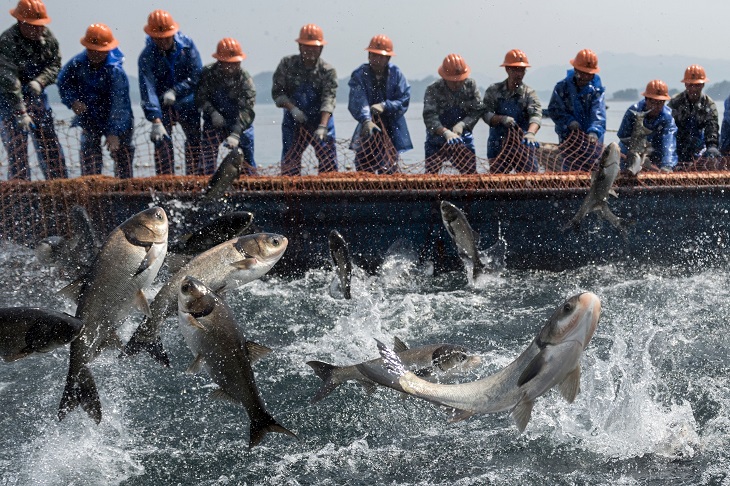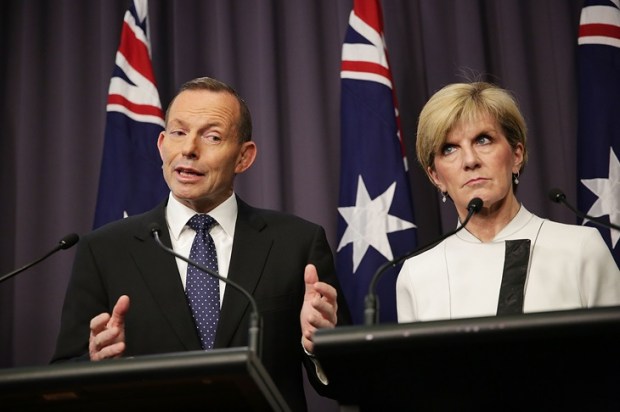Environmentalism now requires the prefix ‘real’ to separate it from its toxic cousin, eco-fascism. In terms of real environmentalism, there are areas that deserve mainstream attention, particularly when it comes to the health of our oceans.
It is also possible to disagree with the final conclusions of an author, but recognise that the bulk of their argument contains something worthwhile.
Rewilding the Sea writer Charles Clover wishes, quite rightly, to salvage our damaged oceans as best we can while being aware of the powerful forces that continuously orchestrate further harm. He also does not shy away from calling out otherwise untouchable political entities who commit sins against the environment in full view of the international community.
Part of his thesis for saving Earth’s oceans centres around the danger posed by government subsidies. Clover is onto something here, with an observation that expands into other areas of the economy.
In Clover’s particular case, he is referring to the problem of over-fishing caused in large part by distant-water trawlers sent out by nations that have already over-fished their local areas. The two biggest culprits are China and the European Union – although the former is excessively worse than any other single entity.
Interestingly for an environmentalist, Clover positively describes the normally self-regulating market forces that would stop over-fishing from becoming a problem.
‘In theory, of course, the world’s wild-capture fisheries should be self-regulating. When fish stocks get low, fishing gets expensive and workers and investors move on. But in practice, unprofitable fleets often continue fishing because of the ultimate enemy of progress: subsidies. The greatest giver of state subsidies in the world, and hence the greatest enemy of progress in the oceans of the world, is China, which provides the greatest volume of harmful subsidies – the ones that cause overfishing – according to an analysis of who doles out the worst subsidies by the International Institute for Environment and Development.’
In essence, if governments did not interfere, scarcity would drive fishing to become an expensive activity, pushing the price of fish too high in turn leading to low demand. This would slow the trade down significantly for a while, giving the oceans time to recover.
Various governments have instead decided to ensure consistency in the availability of fish. To do this, they ‘subsidise’ the industry by handing out billions of dollars in subsidies, pushing the industry beyond its limiting market forces. Government meddling using public money is, according to Clover, driving over-fishing.
To put the problem in perspective, China spends $16.6 billion on subsidies to the fishing industry compared to America’s $1 billion.
Without subsidies, it is more likely that the fishing industry would have moved more rapidly toward fish farming to cover the gap – or even away from fish products entirely. Whatever the market solution was, it would have likely been better for the wild fish population.
We see similar damage being done via subsidies in Australia’s energy sector. Government meddling coupled with untold billions in subsidies and grants to the renewables industry has led directly to Australia’s domestic energy crisis (which is mimicked in other countries).
Subsidies to renewables allows their third-rate, expensive, and otherwise substandard product to replace superior baseload power systems. The existence of subsidies also muddies the cost-benefit calculations of the natural successor to coal – nuclear. Nuclear would likely be ‘free’ if it received the same green shower as wind turbines.
When governments interfere in markets, they almost always do so to the detriment of the entire system.
Take electric vehicles. When left to compete with ordinary cars, their progress into the market was slow, but that hesitation was required to drive a crucial stage of technological refinement. Ecars had to earn their place and prove that they were a product worth buying.
After governments around the world started propping ecars up with public money and constraining their competitors with coercive legislation, their quality plummeted. Now, we are seeing the real damage of ecar subsidies hit – and it could be fatal.
Because governments very nearly mandated renewables and ecars at the same time, they fabricated a rush on rare earths minerals – particularly lithium – that has exceeded mining reserves. The price of these raw materials are already forcing ecars out of reach for most citizens. This situation necessitates more subsidies to make them ‘affordable’ which feeds the cycle until a very empty public purse hits the floor. We are ‘over-fishing’ our rare earths.
Returning to the oceans, Australia has a very real problem protecting its extensive waters – including those in Antarctica – from Chinese and European trawlers. Already, the government has shied away from stopping krill trawlers damaging the precarious ecosystem while a spineless United Nations sits on its hands, either unwilling or afraid to damage relations with Beijing. They’d rather extort money out of Australia over the pristine state of the Great Barrier Reef than hold China to account for eating its way through the world’s protected waters.
While Pacific Nations guilt Australia out of hundreds of millions of dollars over non-existent climate change, they rarely raise a finger to the calculable damage that China does in their local area. Those that do, tread so carefully they may as well not bother.
Rodrigo Duterte, former President of the Philippines, famously said of China’s illegal fishing inside their economic zone that he would not risk sending the military to protect fish stocks. He was quoted before a joint session of Congress in 2019 saying:
‘When Xi [Jinping] says, “I will fish” who can prevent him? If I send my marines to drive away the Chinese fishermen, I guarantee you, not one of them will come home alive.’
Can you imagine what the international backlash would be if Australia insisted in fishing-out Pacific Island waters under the threat of war?
In March of 2021, 220 Chinese ships descended on the Julian Felipe Reef (Whitsun Reef) area that is claimed by the Philippines. These vessels were patrolled by military personnel. Earlier, Defence Chief Delfin Lorenzana had made a statement that: ‘We call on the Chinese to stop this incursion and immediately recall these boats violating our maritime rights and encroaching into our sovereign territory.’
China’s trawlers formed a line along the water, having no interest in sustainable fishing practices regardless of whatever virtue-signalling they carry on with at UN-love-ins. When it matters, China does whatever it likes – the environment be damned.
Protecting both the ocean and the rights of local fishermen is not something that is easily fixed. Recent reports into the situation present few options for the Philippines except to re-embrace a strong military alliance with America and commence joint patrols of claimed waters. Appeasement of China has made the situation worse, a show of strength may be the only real option left short of giving up and accepting China’s permanent and destructive presence on the reef.
‘The presence of legitimate fishermen from the Philippines facing a huge flotilla of foreign maritime militia posing as fishers in its own exclusive economic zone would always convey a strong moral message for international support.’ – Julius Cesar Trajano, research fellow with the Centre for Non-Traditional Studies.
It could be argued that this is wishful thinking, given that there are plenty of people in positions of power that have shrugged during China’s repeated threats to bomb Taiwan from the face of the Earth if it refuses China’s demand of reunification. If the international community won’t save people, why would it save fish?
Another year has passed since then and nothing has been done to abate the worsening situation for local fishermen. Not only are their catches being taken away, their tiny boats are harassed by military-guarded vessels.
‘The foreign ministry in a statement accused the Chinese vessels of disrupting a joint marine scientific research mission as well as energy exploration activities at two sites in the Philippines’ exclusive economic zone.
‘In another statement, it denounced China’s imposition of a fishing moratorium aimed at regenerating fish stocks, an annual ban that includes waters inside the EEZs of Vietnam and the Philippines.’
To be clear, after China destroyed the fish stocks within waters that belonged to other countries, it then enforced a fishing ban on those nations under the guise of environmentalism – something it obviously has no serious interest in.
The ban raised ‘as part of the country’s efforts to promote sustainable marine fishery development and improve marine ecology’, has been widely side-eyed. We now live in the extraordinary world of propaganda where China has successfully convinced environmentalists and the ecologically interested international community that it is the country truly concerned about the ocean, and any of those pesky Pacific nations that oppose the fishing ban clearly don’t care about the environment or the world’s oceans.
China created the problem, then set up a virtual police state over other nations’ waters, all justified under the banner of virtuous climate change. It is an example of eco-policy being used to uphold disputed military claims.
As Clover wrote of China’s trawlers:
‘The European distant-water fleet, while causing great damage far from its home shores, is still dwarfed by China’s distant-water fishing fleet, which is far larger than we thought. It is larger than even the Chinese thought. It is four times larger than even the Chinese government has said on the record that it wants it to be. In 2014, it was assumed in UN circles that the Chinese fleet numbered 3,432 vessels (nearly 14 times bigger than the European fleet). In 2020, the London-based Overseas Development Institute reported that the Chinese distant-water fleet numbered at least 12,490 vessels and that nearly 17,000 vessels had the capacity to fish beyond Chinese waters.’
There’s not much hope that the situation will improve for the Philippines, as the new President, Ferdinand Marcos Jr, is especially cuddly with Xi Jinping. He is the son of dictator Ferdinand Marcos who ruled via martial law in a regime described as ‘constitutional authoritarianism’ and accused of corruption, brutality, and extravagance. It may seem extraordinary that the Philippines would elect the unremorseful son of a tyrant, but the power of propaganda and revisionist history is strong. Several months into the role, and the new President is already dipping his hands into China’s dept-trap diplomacy, seeking the renewal of billion-dollar Chinese loans.
Of the worsening problem of China’s incursion, Director of the University of the Philippines Institute for Maritime Affairs and Law of the Sea, Jay Batongbacal, said:
‘They [China] really envision themselves to be the centre of this region, economically, politically, and militarily. What they want is that eventually the weaker nations simply give up and have them there just to avoid a problem.’
China’s environmental damage goes well beyond over-fishing. The Japan Times writes:
‘Satellite images published by AMTI show China’s land-reclamation efforts in the waters have vastly outstripped those of all other claimants combined.
‘Since 2013, it has ripped up roughly 6,000 hectares of reef to create about 1,300 hectares of new land for artificial islands in the Spartly archipelago, said Poling.
‘The militarised islands – complete with runways, ports, and radar systems – enable Chinese vessels to patrol as far south as Indonesia and Malaysia.
‘Apart from destroying fish breeding grounds and smothering marine life with sediment, experts say Beijing’s actions contravene international law.’
All of this is allowed to happen during the most intense eco-political time in human history. This alone should have made China Exhibit A: Climate Criminal at the last COP27 conference. If any other country behaved in this manner, they would be facing serious intervention by international organisations – but not our friendly local communist dictatorship.
Knowing this, the Australian Greens, Labor, the Teals, and even the Liberal Party remain under the impression that China can be guilted into ‘saving the planet’. China insists that it prefers to deal ‘directly with its neighbours’ over matters of territorial dispute, obviously because it feels confident it can intimidate or corrupt regimes with the threat of overwhelming military violence. On this front, Anthony Albanese is as weak and gullible as his Pacific Island peers.
One Filipino fisherman said that they had become ‘thieves in their own backyard’, forced to fish in darkness to evade China’s trawlers.
The Pacific is only a small corner of China’s fishing program. As Clover wrote:
‘China’s distant-water fishing fleet is sighted almost everywhere: trawling for krill within sight of penguin colonies in the Antarctic; fishing in a huge armada off the Galapagos marine reserve in the tropical Pacific; jiggling for squid in North Korean waters, to the extent that local fishermen starved; trawling with licences granted by poor nations in the waters off West Africa and knocking on the doors of small nations in the Caribbean. When announcing that China was beginning commercial fishing operations for krill in 2015, an official used language from President Xi’s “Belt and Road Initiative” – a “big idea” intended to create a belt of prosperity around a modern Silk Road, carrying goods back (of course) to China. He said: “The Antarctic is a treasure house for all human beings and China should go there and share.”’
How does a nation like Australia hope to have any impact protecting the waters under its watch when its nearest geopolitical force is behaving with such arrogance and disregard? Despite what the likes of Greta Thunberg think, communism is not environmentally friendly. It has created an expansionist empire so powerful that no amount of eco-bullying by the rest of the world can save our oceans from Xi Jinping’s menu.
Got something to add? Join the discussion and comment below.
Get 10 issues for just $10
Subscribe to The Spectator Australia today for the next 10 magazine issues, plus full online access, for just $10.


























Comments
Don't miss out
Join the conversation with other Spectator Australia readers. Subscribe to leave a comment.
SUBSCRIBEAlready a subscriber? Log in